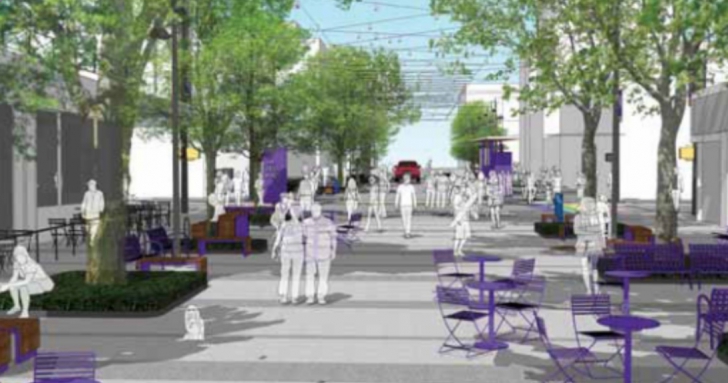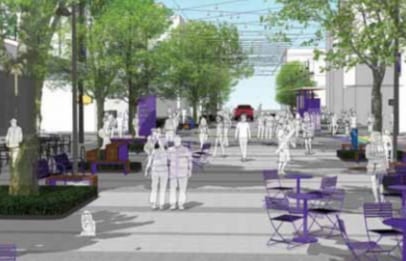
(This illustration from a 2015 City of Vancouver report on the new Jim Deva Plaza shows the proposed design, from the centre of the plaza facing north./City of Vancouver)
Henri Lefebvre was a French 20th century philosopher who understood that the kind of space we produce deeply influences the kind of society we have. In order to change our culture and the ways we relate to each other, we have to change the spaces where we live and interact.
The new Jim Deva Plaza proposed for the heart of Vancouver’s traditionally gay village is a powerful example of this type of change.
North American culture privileges heteronormativity and the automobile. To reclaim road space for pedestrians and to then dedicate it to queer community shows a deliberate desire to change that culture.
The rainbow crosswalk, painted by city officials in 2013 at the intersection of Davie and Bute streets, adjacent to where the new plaza will hopefully sit by Pride 2016, was a symbol of what was to become a focal point for the neighbourhood. Not that symbols aren’t important, but it was just a symbol. It felt kind of like a greeting card: a kind gesture.
The proposed plaza is an actual gift to go along with the greeting card.
Public space is something our community can actually use. (I like practical gifts.) People will meet, become friends, fall in love. There will be first dates and breakups, there will be community celebrations and community memorials. There will be new opportunities to have new interactions in a public space explicitly designated for the queer community.
Right now, the Davie Village has many spaces open to segments of the queer community, but none open to all.
The bars and clubs provide social spaces but due to the focus on alcohol these spaces are not accessible to all ages, or members of our community in recovery. Qmunity provides an inclusive and all-ages space, but its main space is not physically accessible due to the staircase (which organizers look forward to addressing with their new space). Restaurants and cafés can solve some of these issues, but as businesses there is always some level of financial barrier to accessing their spaces.
As a public space, the proposed plaza will be a gathering place for all ages, physically accessible, and not requiring purchase to participate.
A space for our entire community.
Its name is also a gift to future generations because it connects us to our history. It begs the questions: “who was this Jim Deva guy?” and “what’d he do to get his name on something?”
Deva’s work of community building and challenging censorship and shame undoubtably created a healthier and safer community for myself and future generations to come out into. In 50 years, young queer people (or whatever we’re called then) will stumble across a plaque and get to read some of his story.
Maybe they’ll have already learned about him in school in their History of Social Change in the late 20th century class. But if they haven’t, this can still connect them.
When I imagine myself in this future plaza, I can feel a sense of celebration and of pride. A permanent public space is a constant affirmation that our community exists and is deserving of recognition. Not just once a year, but every day.
>> Part two: Will our community living room be a pristine parlour or a lived-in space?
(Drawing from his background in social geography, Andrew Shopland builds heart-centred communities and creates inspiring social change. For some questions he has about the new space, read part two of his guest column here on Thurs, Nov 19 on Daily Xtra.)

 Why you can trust Xtra
Why you can trust Xtra


